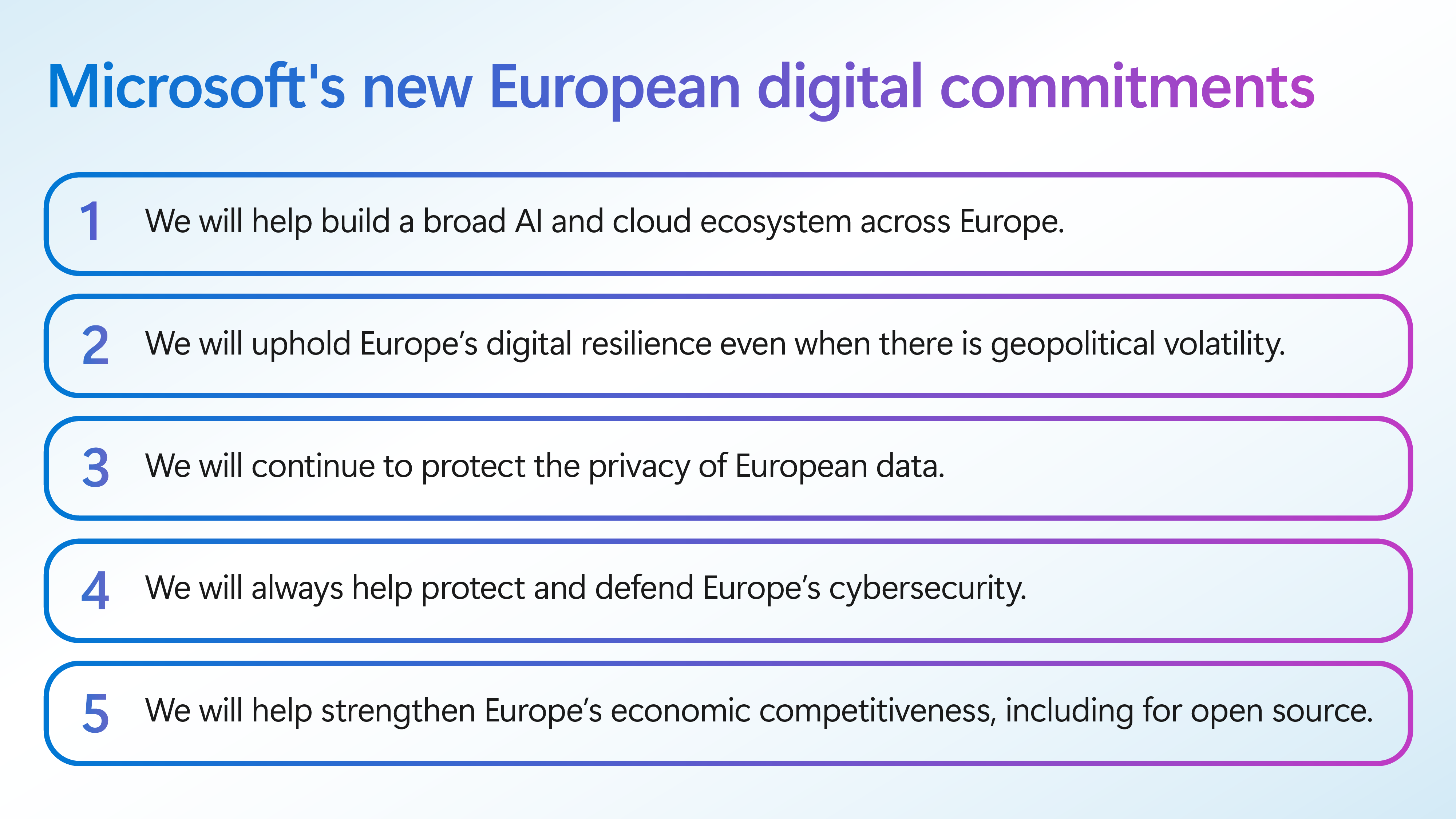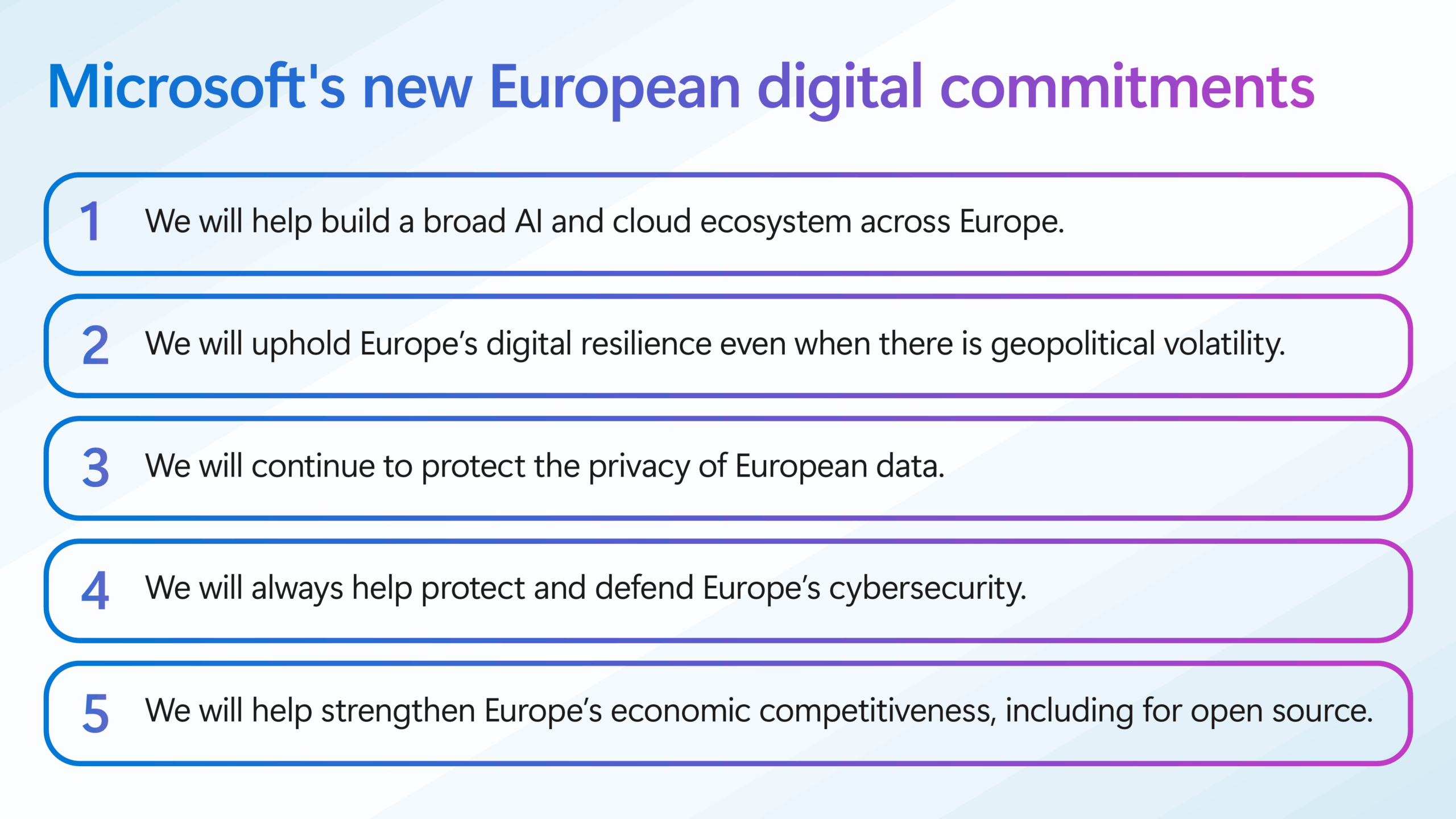Forty-two years ago, Microsoft released its first version of Microsoft Word, marking a significant milestone in the company’s journey to enhance productivity through innovation. This release was particularly important as it represented Microsoft’s first major step into Europe, with the product being localized in multiple European languages, starting with German and French. Since then, Microsoft’s economic reliance on Europe has remained deep, recognizing that its business is critically dependent on the trust of customers, countries, and governments across the continent.
Microsoft respects European values, complies with European laws, and actively defends Europe’s cybersecurity. In a time of geopolitical volatility, Microsoft is committed to providing digital stability. To this end, the company is announcing five digital commitments to Europe:
1. Building a Broad AI and Cloud Ecosystem Across Europe
Microsoft recognizes the need for a world-class AI and cloud ecosystem in Europe. The company is announcing plans to increase its European datacenter capacity by 40% over the next two years, expanding operations in 16 European countries. This expansion aims to boost Europe’s economic growth and competitiveness by enabling every country to fully utilize AI and cloud technologies.
The company’s public cloud datacenters will serve as a foundation for a diversified cloud ecosystem. This includes the Microsoft Cloud for Sovereignty, allowing governments and customers to run on Azure with greater control over data location, encryption, and administrative access. Microsoft is also partnering with European cloud providers to offer its applications and services on their local cloud infrastructure, promoting a diversified technology ecosystem.
2. Upholding Europe’s Digital Resilience
Microsoft is committed to helping Europe navigate geopolitical and trade uncertainties by strengthening the continent’s digital resilience. The company will oversee its European datacenter operations with a European board of directors, operating under European law. In the event of any government order to suspend or cease cloud operations in Europe, Microsoft commits to contesting such measures through all available legal avenues.
The company will also designate European partners with contingency arrangements for operational continuity and store back-up copies of its code in a secure repository in Switzerland. These measures aim to ensure the continuous operation of Microsoft’s datacenters in Europe.
3. Protecting the Privacy of European Data
Microsoft has been at the forefront of designing and implementing technology solutions to protect customer data. The company enables customers to control where their data is stored and processed, how it is encrypted and secured, and when Microsoft can access it. Microsoft’s EU Data Boundary project ensures that European customers’ data is stored and processed within the EU and EFTA regions.
The company offers robust capabilities across its cloud stack, from Azure to Microsoft 365, and provides additional security and encryption options. Microsoft has a strong track record of going to court to protect European customers’ data and has committed to challenging any government demand for EU public sector or enterprise customer data where there is a legal basis for doing so.
4. Defending Europe’s Cybersecurity
Microsoft has provided significant support to Ukraine during the ongoing conflict, evacuating critical data and technology services to its datacenters across Europe and providing cybersecurity support to Ukrainian officials and citizens. The company has also provided cybersecurity support to NATO and other European governments, sharing threat intelligence and protecting elections.
To further enhance cybersecurity, Microsoft is appointing a new Deputy CISO for Europe, dedicated to the company’s security responsibilities in the region. The company is also dedicating additional resources to comply with the Cyber Resilience Act (CRA), engaging with the European Commission, industry partners, and customers on implementation efforts.
5. Strengthening Europe’s Economic Competitiveness
Microsoft recognizes the importance of open access to its AI and cloud platform across Europe, including for open-source development. The company’s AI Access Principles ensure that its Azure AI platform is open to various business models, hosting over 1,800 AI models, mostly open-source. Microsoft has eliminated fees for data transfer when customers choose to switch to another cloud provider, promoting interoperability and customer choice.
By implementing these five digital commitments, Microsoft aims to support Europe’s digital ecosystem, enhance its resilience, protect data privacy, defend cybersecurity, and strengthen economic competitiveness. The company’s longstanding presence in Europe has been a key factor in its success, and it remains committed to supporting the continent’s growth and prosperity.



